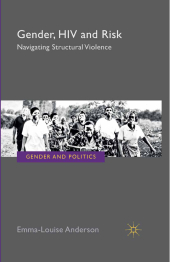 Neuerscheinungen 2015Stand: 2020-02-01 |
Schnellsuche
ISBN/Stichwort/Autor
|
Herderstraße 10
10625 Berlin
Tel.: 030 315 714 16
Fax 030 315 714 14
info@buchspektrum.de |

E. Anderson
Gender, HIV and Risk
Navigating structural violence
1st ed. 2015. 2015. xiii, 191 S. 216 mm
Verlag/Jahr: SPRINGER PALGRAVE MACMILLAN; PALGRAVE MACMILLAN UK 2015
ISBN: 1-349-33256-9 (1349332569)
Neue ISBN: 978-1-349-33256-4 (9781349332564)
Preis und Lieferzeit: Bitte klicken
This book examines the gender context of HIV and critiques the global policy response. Anderson contributes to the feminist task of de-invisibilising gender as structural violence and identifies how gendered power structures are responded to at the local level in Malawi.
Introduction: Gendered Risk as Structural Violence 1. Framing the Virus: The Policy Response to HIV 2. Methodology 3. Sex for Security: Gendered Poverty 4. Sex for Well-being: The Gendered Value of Life 5. Gender on the Agenda?: Empowerment Conclusion: Gender Social Justice Appendix: Interviews, Consultations and Focus Groups Bibliography Index
´Anderson has produced a wonderful study of global health politics and policy. Pursuing a timely ´health from below´ perspective informed by extensive fieldwork, Anderson´s book advances a richly contextualized account of HIV/AIDS in Malawi offering much-needed space to those indigenous voices usually marginalized in international development and security discourses. Marshalling a wealth of interdisciplinary material, Anderson does a masterful job of rendering visible the gendered structural violence driving HIV-risk in Malawi, and the resulting need to think policy beyond empowerment alone. A highly illuminating and instructive read for anyone interested in global health, gender, HIV/AIDS and Africa.´
Professor Stefan Elbe, Director of the Centre for Global Health Policy, University of Sussex, UK
´Gender HIV and Risk does what good books should do: it takes the controversial idea of gender as structural violence and makes it seem both obvious and important. It is a richly researched call to arms of the need to take structure seriously when thinking about HIV/AIDS and to navigate the intersectionality of gender, poverty, and security to fully understand the power dynamics of global health politics.´
Dr Sophie Harman, Reader in International Politics, Queen Mary University of London, UK
´Too often, mainstream approaches to understanding the gender dynamics shaping HIV risk and resilience fail to capture the pathways between micro-level social relations and the deeper structures in which these gendered social/power relations are rooted. Through an extensive local level field research that analyzes the voices of Malawian people, Anderson uncovers these gendered power dynamics as well as the strategies that women employ to navigate a better life for themselves in the context of the HIV/AIDS epidemic. Her scholarship illuminates the limitations of behaviorist policy responses, and the ubiquitous gender mainstreaming strategy of ´women´s economic empowerment´ in addressing gendered social relations rooted in the structural violence that shapes the feminization of HIV/AIDS. Anderson´s book points to the necessity of addressing deeply entrenched structural violence beyond the typically short-term visions and narrow metrics of development institutions; it is also a call for scholars of Security and Development to take gender seriously.´
Dr. Colleen O´Manique, Associate Professor in Gender & Women´s Studies and International Development Studies, Trent University, Canada


